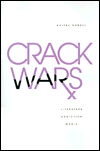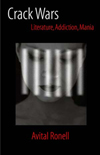Avital Ronell |
Biographical Information
-
[Copyright 1998 D.
Diane Davis.] [Mirror
site]
Avital Ronell is chair of the Department of Germanic Languages
and Literature at New York University, where she is a professor of German,
English, & comparative literature. Ronell was born in Prague. Her parents
were Israeli diplomats who returned to Israel before going to New York; she
studied at the Hermeneutics Institute in Berlin with Jacob Taubes, ultimately
earned her doctorate at Princeton University, and then worked with Jacques
Derrida and Hélène Cixous in Paris. She was professor of comparative
literature and theory at the University of California at Berkeley for several
years before eventually returning to New York, where she currently teaches
German and comparative literature and theory—in addition to her yearly
Fall semester seminar with Derrida—and where she continues to churn out
a breathtaking range of rigorously deconstructive rereadings of everything
from technology, the Gulf War, and AIDS to opera, addiction, and stupidity.
Her new book, Stupidity,
is just out (December 2001), and she is currently at work on The Test Drive.
Summary of Major Themes
Avital Ronell is perhaps the most interesting scholar in America.
—Gregory Ulmer, back cover blurb from Crack WarsAvital Ronell has put together what must be one of the most remarkable critical oeuvres of our era . . . . Zeugmatically yoking the slang of pop culture with philosophical analysis, forcing the confrontation of high literature and technology or drug culture, Avital Ronell produces sentences that startle, irritate, illuminate. At once hilarious and refractory, her books are like no others.
—Jonathan Culler, "On the Work of Avital Ronell." diacritics 24.4 (winter 1994): 27
Avital Ronell's "remarkable" and edge-pushing oeuvre is informed and facilitated by a wide range of (post)philosophers—including, for example, Derrida, Nietzsche, Heidegger, Levinas, Blanchot, Lacoue-Labarthe, and Nancy—but when it comes down to it, as Eduardo Cadava observes, "Ronell's work remains absolutely different." From her first book, Dictations, through her latest one, Stupidity, Ronell calls the established questions into question, zooming in on whatever "withdraws from immediate promises of transparency or meaning" and/or tracking what she calls the "rhetorical unconscious of a text" ("Confessions" 249). As Culler notes above, however, Ronell's works are remarkable—startling, irritating, illuminating—at the level of the sentence, as well. A striking hybrid of high theory and street talk, Ronell's texts come off gutsy, rough, and edgy, but at the same time exceptionally dense and philosophically rigorous. That is, Ronell's texts are remarkable both for what they say and for the extraordinary way in which they say it.
Ronell's thoroughly postfoundational and (so) posthumanist redescriptions, for example, of the telephone, the writer, and the addict, relentlessly pry open again thinking-zones that had been closed up and covered over. And this is where Ronell's texts remain, in the open-ing, in the coming of open-ness; perpetually deterritorializing without reterritorializing, Ronell's work seems most at home in the unhomey danger zone that it catalyzes, right there where the "ground" is shaking and all the edifices are coming (crashing) down. The reader is asked to enjoy the destruction and disorientation and to risk her/himself (without a hardhat), to join Ronell in this perpetual opening/rupturing, in an affirmative embrace of nonclosure.
In her first book, Dictations, Ronell tells us that she "has never entertained any illusions concerning the objective nature of scholarship, no matter how tedious or dusty it can appear to be." Each of her works goes after a seemingly recognizable and knowable signifier (Goethe, the telephone, the drug addict, the television, the test, the greeting, stupidity, etc.) but then tracks it so closely that it quickly becomes unrecognizable, exceeding its object-status, overflowing itself as a concept. Explicitly breaking with scholarly tradition, a tradition that values mastery and certitude, Ronell engages her “object” of study at the level of its finitude, of its radical singularity. In Stupidity, for example, Ronell begins with the concept of stupidity, tracking it through poets and novelists and philosophers and literary/critical theorists, and pre-schoolers—but the closer she gets to it, each time, the more it exceeds itself as a concept. The closer she brings us to it, the more unknowable it appears.
One of stupidity's many guises, Ronell says several times, is the claim to absolute Knowledge or Intelligence. And it's in that context that one should read Ronell's determination to remain open, exposed to stupidity’s inscriptions and operations, to refrain from closing off or closing in on stupidity in order to pretend to “get” it or to represent it accurately. Ronell presents herself as somewhat "stupid" about stupidity throughout the book, and this is not only exceptionally courageous in academe, it’s also a significant ethico-political move. It would have been much easier to go the standard "scholarly" route, to stay just far enough away from the "thing" to re-conceive of it, to adapt the existing concept so that it more accurately represents the truth of its object. But "if stupidity were that simple," if it were that comprehensible, that intelligible—"if stupidity were that stupid," as Ronell puts it—"it would not have traded depths for the pits and acted as such a terror for Roland Barthes or Robert Musil or pre-schoolers" (10). So Ronell sticks with stupidity, tracks and traces it, opens to it, re/discovering in each (missed) encounter with it a fundamental inability to know it completely or objectively, and therefore a fundamental inability to represent it.
It would be a mistake, however, to assume that there is no imperative to understand in Ronell's work; clearly, her work is driven by that imperative. It's just that what goes by the name “understanding” gets a radical update in her work inasmuch as she determines not to wipe out (objectify) the "object" of this "understanding" in the very rush to pin it down and define it. The link that academe posits and propagates between rigor and certitude (the former leading to the latter) gets busted in Ronell's works, which are always incredibly rigorous and theoretically sophisticated interruptions of certitude. As she notes in an interview in JAC, she approaches her “object” of inquiry not as a police officer going after a suspect but in detective mode, turning in her badge and assuming a different rapport with the truth, one that involves breaking with standard (academic) procedure in order to remain attuned to finite singularity, in order to refrain from infinitizing finitude (as she put it in Finitude’s Score).
Another striking aspect of Ronell’s work is its attentiveness to the materiality of language—that is, to the sound, shape, size, beat or rhythm, etc. of the words themselves. The Telephone Book, Crack Wars, and Stupidity all explicitly call our attention to the texture of the text, to the fact that language is a material “medium” that cannot not interrupt, suspend, resist, exceed, and otherwise trip up the very message it is charged to deliver. Words inevitably go AWOL, bagging their referential duty and going off on their own, connecting not to the idea they are supposed to represent but to other words—and making all kinds of “noise” while they’re at it. Ronell affirms this noise, amplifies it, and asks us in The Telephone Book to learn hear it by learning to read with our ears.
If a foundational approach to language acknowledges that the word negates the actual “thing” in order to bring an operational concept into being (which implies a triumph for the subject over the “world,” for “meaning” over “chaos”), Ronell's nonfoundational approach embraces a language that goes on to obliterate the concept, too, by ignoring and/or exceeding it, sparking a proliferation of meaning in discourse. From this perspective, it is language that triumphs over the concept, including the concept of “the subject,” infinitely and indiscriminately breeding meanings that detach from the writer’s intentions and that remain inappropriable to any single interpretation. Ronell embraces the materiality of language very explicitly, cranking up the noisy texture of the words themselves through wildly unconventional page design and an in-your-face typographical performance.
Inasmuch as it showcases language's double negation, this textual performance amounts to a destructive affirmation—or an affirmation of destruction—no doubt about it. Still, Ronell's work steers clear of "undeveloped pronouncements of nihilism," and in Stupidity she reminds her readers of the "Heideggerian distinction between destruction and devastation." "Destruction," she says, "involves the force of a critical clearing and does not imply the shell-shock stoppage of devastation" (122). In the opening pages of Finitude's Score, she more thoroughly sketches out this distinction: whereas devastation "has to do with a fundamental shutdown," a "pathological" drive toward "a telic finality or fulfillment or the accomplishment, once and for all, of a Goal," destruction, Ronell says, is "a decisive doing away with that which, already destroyed, is destructive in its continuance. To the extent that it is possible only on the basis of a new and more radical affirmation, destruction, moreover, has pledged itself to the future" (Finitude's Score xiii).
Ronell's work is relentlessly destructive, relentlessly turned toward futurity, and it throws its disorienting smack in the name of what she calls "responsible responsiveness." Whatever the topic at hand, Ronell's overarching concern is with an "ethics of decision" for this postfoundational era—an era in which all the transcendental navigation systems are down: "To the extent that one may no longer be simply guided—by Truth, by light or logos—decisions have to be made." It's only in certitude's interruption that meaning's inappropriability is exposed; and it's only in that exposure that an ethics of decision becomes available: as Ronell reminds us, "no decision is strictly possible without the experience of the undecidable" (Crack Wars 58).
Selected Publications
[Note: Contributed by D. Diane Davis.]
BOOKS
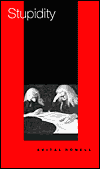 |
Stupidity.
|
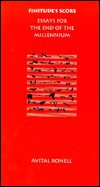 |
Finitude's
Score: Essays for the End of the Millennium. |
|
|
Crack
Wars: Literature, Addiction, Mania. Univ. of Nebraska Press, 1992. New edition coming out with University of Illinois Press very soon. |
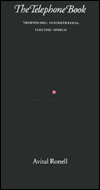 |
The
Telephone Book: Technology-Schizophrenia-Electric Speech. Univ. of Nebraska Press, 1989. |
 |
Dictations:
On Haunted Writing. |
ARTICLES
"The Uninterrogated Question of Stupidity." differences: A Journal of Feminist Cultural Studies 8.2 (Summ 1996): 1-19.
"The Test Drive," in Deconstruction Is/in America: A New Sense of the Political. Ed Anselm Haverkamp. (New York University Press, 1995).
"Our Narcotic Modernity," in Rethinking Technologies. Ed. Verena Andermatt Conley. (Univ. of Minnesota Press, 1993).
"Support Our Tropes I: Reading Desert Storm." Rhetorical Republic: Governing Representations in American Politics. Ed. Frederick M. Dolan and Thomas L. Dumm. Amherst: U of Massachusetts P, 1993. 13-37.
"Video/Television/Rodney King: Twelve Steps beyond the Pleasure Principle." differences: A Journal of Feminist Cultural Studies 4.2 (1992): 1-15.
"Support Our Tropes II (Or Why in Cyburbia There Are a Lot of Cowboys)." Yale Journal of Criticism 5 (Spr 1992):
"Opera and Technology: Scoring on the Telephone." 1-800 2 (Spring/Summer 1991): 40-45, 55, 63-65.
"The Walking Switchboard." Substance 61 (1990): 75-94.
"Namely, Eckerman," in Looking After Nietzsche. Ed. Laurence A. Rickles. (SUNY Press, 1990).
"The Worst Neighborhoods of the Real: Philosophy-Telephone-Contamination." differences: A Journal of Feminist Cultural Studies 1 (1989): 125-145.
"Starting from Scratch: Mastermix." Socialist Review 18.2 (1988): 73-85.
"The Differends of Man." diacritics 19 (Fall-Wint 1988): 63-75.
"The Sujet Suppositaire: Freud and the Rat Man," in On Puns: The Foundation of Letters. Ed. Jonathan Culler. (Blackwell, 1988), pp. 115-139.
"Hitting the Streets: Ecce Fama." Stanford Italian Review 6 (1988): 119-140.
"Doing Kafka in the Castle: A Poetics of Desire," in Kafka and the Contemporary Critical Performance: Centenary. Ed. Alan Udoff. (Indiana Univ. Press, 1987), pp. 214-235.
"Street Talk." Studies in Twentieth Century Literature 11 (Fall 1986): 105-131.
"Taking it Philosophically: Torquato Tasso's Women as Theorists." MLN 100 (Apr 1985): 599-631.
"Goethezeit," in Taking Chances: Derrida, Psychoanalysis,and Literature. (Johns Hopkins Univ. Press, 1984), pp. 146-182.
"Sutura Goethei: L'Articulations Freud-Goethe." Cahiers Confrontation 12 (Aut 1984): 131-140.
"Queens of the Night: Nietzsche's Antibodies." Genre 16 (Wint 1983): 405-422.
TRANSLATIONS
Philippe Lacoue-Labarthe's "The Response of Ulysses." In Eduardo Cadava, Peter Connor, and Jean-Luc Nancy, ed., Who Comes After the Subject?. New York: Routledge, 1991. 198-205.
Jacques Derrida's "Devant la loi." In Alan Udoff, ed., Kafka and the Contemporary Critical Performance: Centenary. Bloomington: Indiana University Press, 1987. 128-149.
Jacques Derrida's "A Peine." In Mémoires: For Paul de Man. Cecile Lindsay, Jonathan Culler, and Eduardo Cadava, Ed and Trans. The Wellek Library Lectures at the University of California, Irvine. New York: Columbia University Press, 1986.
(With Peggy Kamuf) J. Jacques Derrida's The Ear of the Other: Otobiography, Transference, Translation: Texts and Discussions with Jacques Derrida. Ed. Christie V. McDonald. New York: Schocken Books, 1985.
Jacques Derrida's 'All Ears: Nietzsche's Otobiography.' Yale French Studies 63 (1982): 245-250.
Jacques Derrida's "The Law of Genre." Glyph: Textual Studies 7 (1980): 202-229.
INTERVIEWS
"Confessions of an Anacoluthon: Avital Ronell on Writing, Technology, Pedagogy, Politics." With D. Diane Davis. JAC: A Journal of Composition Theory. 20.2 (2000): 243-281.
Avital Ronell Interview. With Alexander Laurence for AltX (1994).
"Avital Ronell: On Hallucinogenres." With Gary Wolf. Mondo 2000. Issue No. 4.
"Avital Ronell." With Andrea Juno in Re/Search: Angry Women 13 (1991): 127-153.
Selected Internet Sites
NYU Department of Germananic Languages and Literature.
Alexander Laurence's interview with Avital Ronell.
Arkadi Dragomoshchenko's The Secretary of a Ghost.
A partial bibliography of Avital Ronell's works.
A Google Search for Avital Ronell.
Jump to one of these related pages: |
|
COPYRIGHT 1999 KRISTIN SWITALA. ALL RIGHTS RESERVED. |

